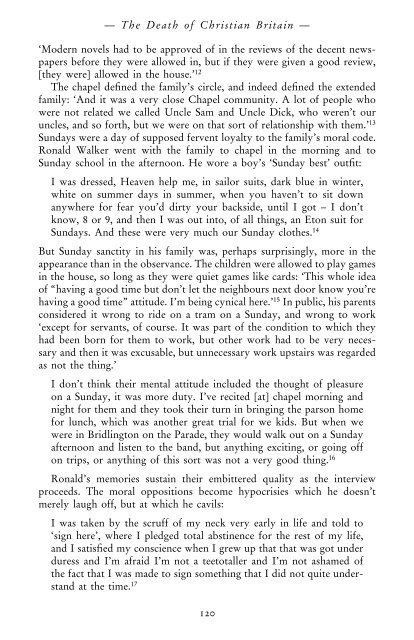The Death of Christian Britain
The Death of Christian Britain
The Death of Christian Britain
Create successful ePaper yourself
Turn your PDF publications into a flip-book with our unique Google optimized e-Paper software.
— <strong>The</strong> <strong>Death</strong> <strong>of</strong> <strong>Christian</strong> <strong>Britain</strong> —<br />
‘Modern novels had to be approved <strong>of</strong> in the reviews <strong>of</strong> the decent newspapers<br />
before they were allowed in, but if they were given a good review,<br />
[they were] allowed in the house.’ 12<br />
<strong>The</strong> chapel defined the family’s circle, and indeed defined the extended<br />
family: ‘And it was a very close Chapel community. A lot <strong>of</strong> people who<br />
were not related we called Uncle Sam and Uncle Dick, who weren’t our<br />
uncles, and so forth, but we were on that sort <strong>of</strong> relationship with them.’ 13<br />
Sundays were a day <strong>of</strong> supposed fervent loyalty to the family’s moral code.<br />
Ronald Walker went with the family to chapel in the morning and to<br />
Sunday school in the afternoon. He wore a boy’s ‘Sunday best’ outfit:<br />
I was dressed, Heaven help me, in sailor suits, dark blue in winter,<br />
white on summer days in summer, when you haven’t to sit down<br />
anywhere for fear you’d dirty your backside, until I got – I don’t<br />
know, 8 or 9, and then I was out into, <strong>of</strong> all things, an Eton suit for<br />
Sundays. And these were very much our Sunday clothes. 14<br />
But Sunday sanctity in his family was, perhaps surprisingly, more in the<br />
appearance than in the observance. <strong>The</strong> children were allowed to play games<br />
in the house, so long as they were quiet games like cards: ‘This whole idea<br />
<strong>of</strong> “having a good time but don’t let the neighbours next door know you’re<br />
having a good time” attitude. I’m being cynical here.’ 15 In public, his parents<br />
considered it wrong to ride on a tram on a Sunday, and wrong to work<br />
‘except for servants, <strong>of</strong> course. It was part <strong>of</strong> the condition to which they<br />
had been born for them to work, but other work had to be very necessary<br />
and then it was excusable, but unnecessary work upstairs was regarded<br />
as not the thing.’<br />
I don’t think their mental attitude included the thought <strong>of</strong> pleasure<br />
on a Sunday, it was more duty. I’ve recited [at] chapel morning and<br />
night for them and they took their turn in bringing the parson home<br />
for lunch, which was another great trial for we kids. But when we<br />
were in Bridlington on the Parade, they would walk out on a Sunday<br />
afternoon and listen to the band, but anything exciting, or going <strong>of</strong>f<br />
on trips, or anything <strong>of</strong> this sort was not a very good thing. 16<br />
Ronald’s memories sustain their embittered quality as the interview<br />
proceeds. <strong>The</strong> moral oppositions become hypocrisies which he doesn’t<br />
merely laugh <strong>of</strong>f, but at which he cavils:<br />
I was taken by the scruff <strong>of</strong> my neck very early in life and told to<br />
‘sign here’, where I pledged total abstinence for the rest <strong>of</strong> my life,<br />
and I satisfied my conscience when I grew up that that was got under<br />
duress and I’m afraid I’m not a teetotaller and I’m not ashamed <strong>of</strong><br />
the fact that I was made to sign something that I did not quite understand<br />
at the time. 17<br />
120








